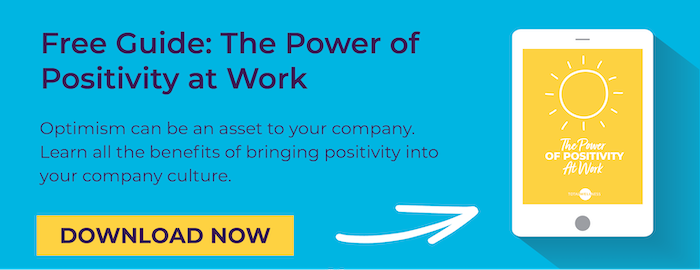 Positivity can make all the difference in an employee’s journey towards better health. A positive mindset has some obvious mental health benefits including decreased stress, improved relationships and a lower risk for depression and anxiety.
Positivity can make all the difference in an employee’s journey towards better health. A positive mindset has some obvious mental health benefits including decreased stress, improved relationships and a lower risk for depression and anxiety.
What you might not have known, however, is that optimism has also been associated with some awesome physical health benefits. Many optimistic people are more resilient—meaning they can bounce back more quickly and easily. Their resilience helps them to overcome and avoid illness much more efficiently than their pessimistic counterparts.
While it’s clear that positivity is a personality trait that’s good to adopt, it’s not always easy. When it comes to health and wellness, negative thoughts can creep into your employees’ minds as a reaction to what’s going on in their lives. They can’t necessarily stop those negative thoughts from popping up.
They can, however, spin those negative thoughts into something much more positive. The best way to do that is to be prepared! You and your employees need to recognize your negative thoughts for what they are so you can tackle them before they tackle you.
Check out these common types of negative thoughts and share them with your workforce so you can be prepared take a step towards the positive.
Thinking in Extremes
Extreme thoughts usually fall into an “always/never” or “all or nothing” category. You might be guilty of this if you think your job is always stressful or if you think you shouldn’t work out because it won’t be worth it if you don’t have an hour to devote to your local boot camp class. You might also be guilty of this type of negative thinking if you turn every negative situation into a catastrophe! Let’s remember to see those mole hills for what they are…
Filtering Out the Positives
Even on your worst day, there are probably some positive things present. This negative thought process filters out those positives and focuses on or magnifies the negatives. Without letting the light of positive circumstances shine through, life can get pretty dark.
Fortune Telling
Let’s face it—you don’t know what’s going to happen in the future. So convincing yourself that the worst possible scenario is the one that will occur just doesn’t make sense. Live in the present and focus on what’s happening now.
Jumping to Conclusions
Unless you can read other people’s minds, there really is no reason to jump to conclusions. Odds are, the conclusions you’re jumping to are completely unfounded. Convincing yourself you know exactly what others are thinking can lead to comparison and a negative perception of yourself.
Thinking with Your Feelings
One huge mistake you and your employees might be making is to take your emotions as fact. This type of emotional reasoning gives you a completely skewed lens of what’s actually happening. Learn to weed through your emotions to get to the truth.
Feeling the Guilt
If you find yourself using words like “should,” “must,” and “have to,” you’re probably trapped in some guilty thoughts. Viewing your health journey as a punishment or mandate is one way to make it much more difficult than it needs to be. Focus on the great things a healthy lifestyle can offer so you’ll truly want to build healthy habits.
Personalizing Situations
We’re not going to beat around the bush with this one—the world does not revolve around you! When it comes to negative situations, far too many people think it does. If you find yourself constantly worrying that bad things happen because of something you did or didn’t do, you might need to work on this negative thought pattern.
Making Excuses
Some things you simply need to hold yourself accountable for. It might be difficult at first, but in the long run consistently coming up with excuses can be a very negative thought process.
Negative thoughts happen, and that’s okay. The best way to push past them is to prepare yourself for when they arise. If you notice one of these eight negative thoughts becoming a regular occurrence in your mind, it might be time to look into specific strategies for that particular thought pattern.
As a rule of thumb, though, you can take on these negative thoughts with one simple question… “Is it true?” In most cases, the automatic negative thoughts that creep into your brain aren’t grounded in reality or supported by any sort of evidence. Take a minute to see a negative thought for what it is.
If it is true, what can you do to change it? If it’s not true, what is positive about the situation?
Positivity is an asset for you and your employees’ health. Be intentional about the thoughts you let fill your mind. Try to address these common types of negative thoughts and seek to see the positive things that are always present.
Which negative thoughts patterns have you struggled with? Let us know how you’ve overcome them in the comments below!



